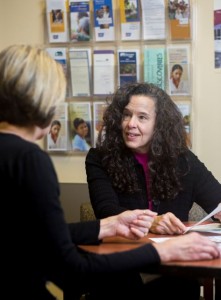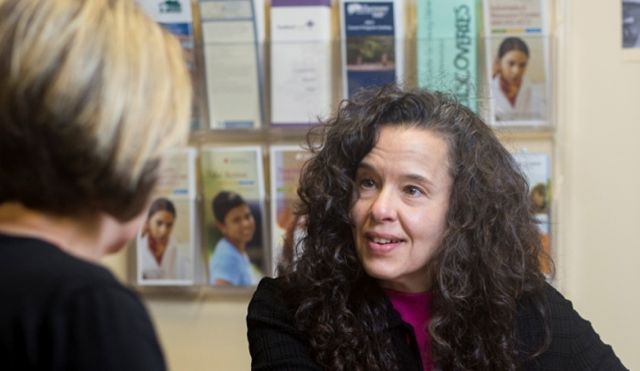By Lisa Herrick
![]() One in two men and one in three women will be diagnosed with cancer in their lifetime. More people today are surviving cancer than ever before due to improvements in detection, diagnosis, treatment and follow-up care. That means approximately one in twenty adults in the United States is a cancer survivor. Survival often introduces new and unexpected stresses—both immediate and in the long-term.
One in two men and one in three women will be diagnosed with cancer in their lifetime. More people today are surviving cancer than ever before due to improvements in detection, diagnosis, treatment and follow-up care. That means approximately one in twenty adults in the United States is a cancer survivor. Survival often introduces new and unexpected stresses—both immediate and in the long-term.

Michelle Cohen is a cancer survivor in our community. Three years ago she was informed she had lobular carcinoma in situ (LCIS), which is considered a risk for breast cancer due to the abnormal cell growth inside the lobules of the breast. Two months prior, Cohen had unexpectedly lost her husband leaving her a widow with three young children, uncertainty of her cancer risk and in a place of grief. Cohen was advised to make the changes one normally does to reduce the risk of breast cancer, such as altering her diet, as well as continuing with regular mammograms. Then, in September 2012, Cohen was diagnosed with invasive lobular carcinoma (ILC), a type of breast cancer that starts in a lobule and spreads to surrounding breast tissue. Cohen had a 7.2 centimeter slow growing tumor requiring two surgeries, four chemotherapy treatments, and thirty-three days of radiation.
“When I was going through radiation, I was pretty emotional,” Cohen shares. “It was hard and scary. I did not have a spouse with me. I had family and friends but ultimately at night I was alone. People kept asking me, ‘Have you talked to Cobie?’”
Dr. Cobie Whitten is a driving force in our community for establishing a permanent Cancer Survivorship Clinic. A Cancer Survivorship Clinic, a term used to describe services rather than an actual physical clinic, promotes physical, psychological, spiritual, and social well being for those diagnosed and living with cancer. Survivorship services include individualized survivorship care plans, coordination of all aspects of care, as well as support groups and education for patients, caregivers and providers.
Dr. Whitten recognizes the increasing need in our community to provide cancer survivorship services to individuals like Cohen and believes it is our obligation to guide people from the moment of diagnosis throughout the remainder of life be it months or decades. Providence St. Peter Foundation has designated the establishment of a permanent Cancer Survivorship Clinic and significantly improving the quality of life for patients and their loved ones in our region as a goal of their Christmas Forest holiday fundraiser.

Dr. Whitten will run the Cancer Survivorship Clinic, along with Dr. James Lechner, medical director for Providence Regional Cancer System. The facility will be staffed by an advanced registered nurse practitioner. Dr. Whitten says, “We are so focused on diagnosis and treating the disease. But what happens after treatment? What happens after the casseroles stop coming and the hair grows back in? Cancer and its treatment can have long-lasting or late-onset effects on your body. We need to guide survivors with a care plan that describes their cancer, the treatments they had, and what they need to do now to stay healthy and optimize their wellness.”
Cohen reflects on her treatment. “The survivorship services were like a light at the end of the tunnel for me. When you are in the middle of treatment you are just in survival mode. You are just trying to get through the headache, the pain in your body, the nausea. I finished radiation in June and told myself I have two months this summer to start feeling better so that I could go to the Cancer Transitions program in the fall.” Cohen just completed the program.
“I was determined to go every Tuesday night, even if I had to take a nap during the day, just so I could stay up. It meant that much to me. Suddenly you are with people who understand what you are going through. First thing I said was, ‘I am so excited to be in a room with other people with short, curly grey hair,'” says Cohen.
Cohen continues, “Knowing that there were survivorship services available to me kept me moving and dealing with setbacks like feeling rotten for three days and wondering why. The thought of an actual Survivorship Care Plan is a huge tool for me as I move forward.”
With courage, humor and optimism Cohen remarks, “I like to believe I am done. I did my cancer battle. I am done. But I know better deep down. Now I am at a higher risk for other things. And the potential side effects…now that scares me. But it does not control my life. It does not rule my life.”
To learn more about the Providence St. Peter Foundation, click here.




















































